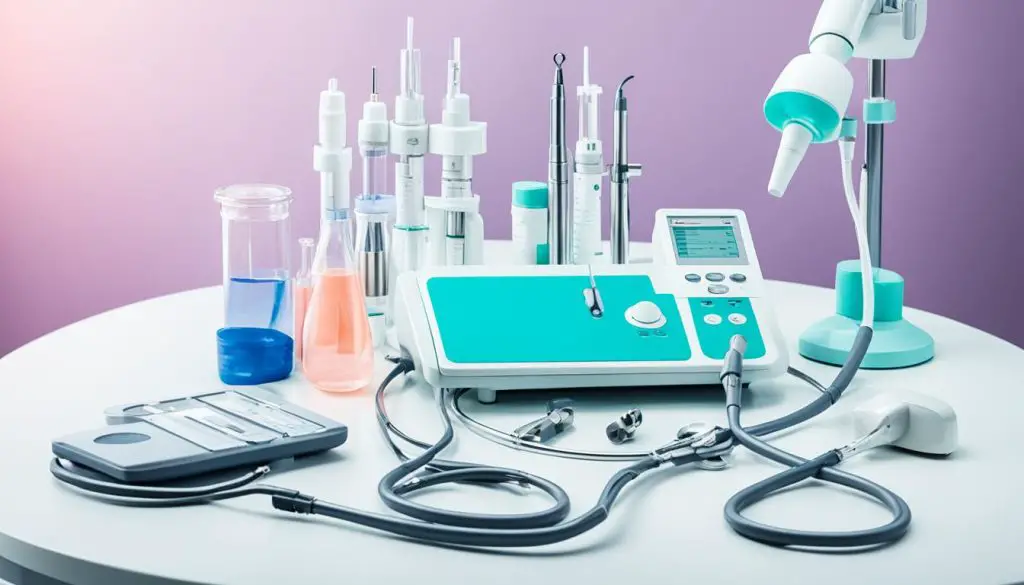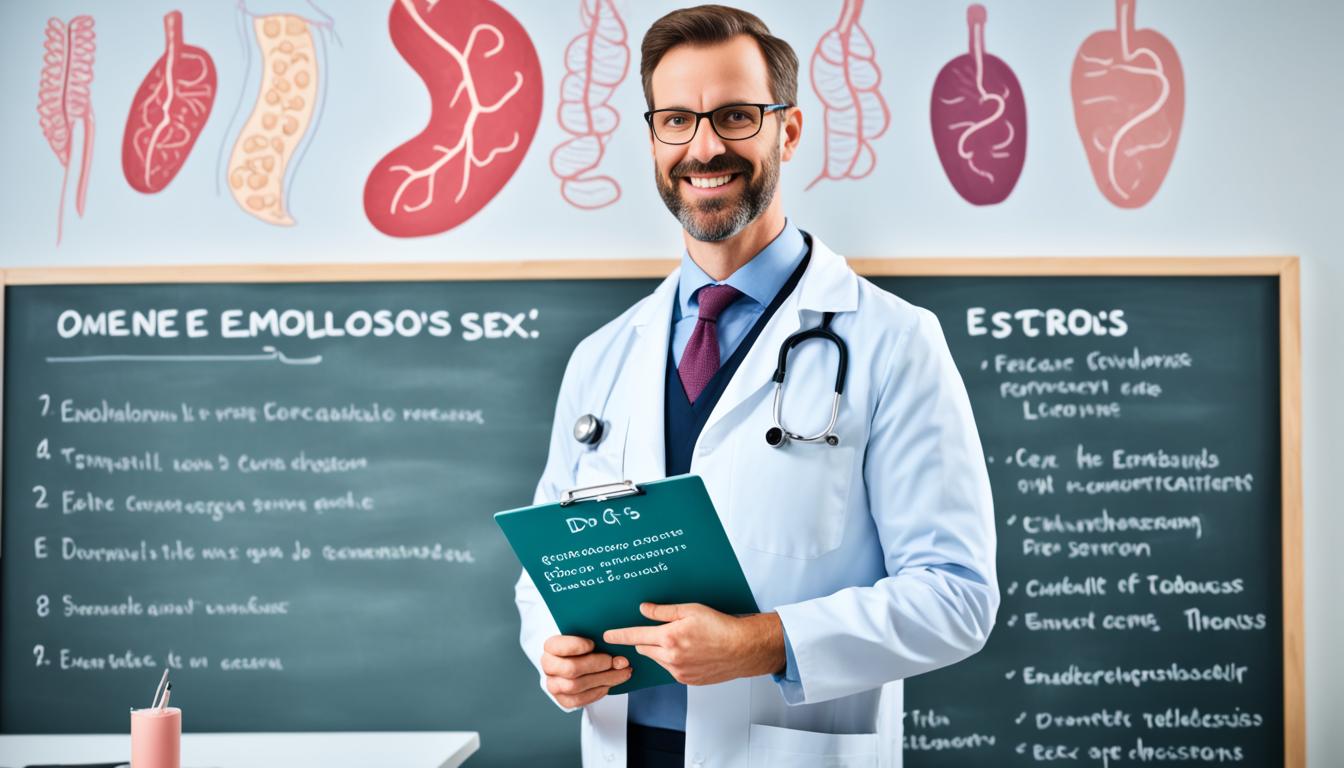Living with endometriosis and fibromyalgia presents its challenges. The pain and fatigue can significantly affect intimacy. You might ask, “Is there any advice from doctors about sex with endometriosis?” Many have pondered this question.
Endometriosis often causes sex to be painful for those with the condition. This can strain relationships and leave couples feeling disheartened. However, there is hope. Medical professionals offer strategies to manage the pain and improve intimacy.
This article will explore endometriosis, its symptoms, and treatment options. We’ll also look at how it can affect your sexual health. We aim to share expert advice on managing intimacy, finding positions that reduce pain, and underlining the importance of open communication and support.
Thinking about how to handle sex when you have endometriosis? Or wanting to make intimacy better while living with this condition? Keep reading. We’ll share practical tips to help you empower yourself. You’ll dive into ways to reignite your hope for a satisfying sex life.
Understanding Painful Sex with Endometriosis
Feeling pain during sex is common for those with endometriosis. It happens because of the pulling of endometrial tissue. This can mess with the natural lubrication, making pain worse. Not everyone feels pain with endometriosis, but for those who do, it varies in how bad and where it hurts. It’s important to find ways to deal with and lessen this pain to aid a healthy sex life.
For someone with endometriosis, knowing how this illness affects sex is key. Addressing the pain from sex can improve your sex life and emotional closeness with your partner.
One strategy to deal with sex pain from endometriosis is to talk openly with your partner. Sharing what does and doesn’t work, trying new positions, and exploring other ways to be close can help a lot. These steps may ease the impact of endometriosis and keep your sex life enjoyable.
Managing Endometriosis Pain During Intercourse:
- Try different sex positions that avoid pushing on sensitive areas
- Enjoy other sex activities, like oral sex, massages, or foreplay
- Use more lube to ease dryness and reduce friction
- Opt for a slower, gentler approach to avoid so much pain
- Always talk to your partner and figure out solutions together
Also, getting advice from doctors who know about endometriosis is crucial. They can offer tailored suggestions and recommend treatments to lessen pain during sex.
Actively dealing with endometriosis pain during sex can help keep your sex life and overall well-being strong. This reduces the negative effects of the illness on your life.
Positions and Techniques for Managing Pain
Handling endometriosis pain during sex includes trying various positions and methods. This can greatly affect your sex life and satisfaction. By discovering positions that ease pelvis pressure and trying other intimate actions, you can still have a great sex life. This is even with the challenges of endometriosis.
Exploring Comfortable Positions
Several sexual positions may lessen endometriosis pain during sex. These positions reduce pressure on sensitive areas of the pelvis, making sex more bearable. Finding the right positions takes some trial and error. Nonetheless, some known to be helpful include:
- Side-lying position: This method can lessen pressure and deepen intimacy. It offers control over penetration depth and speed, lowering discomfort.
- Woman on top: The person can adjust penetration, making sex more comfortable.
- Spooning position: It encourages shallow penetration, easing the pressure on the pelvis. This position also strengthens emotional bonds.
Remember, talking to your partner is crucial. Sharing what feels good and what doesn’t can guide you to the best positions. Each person’s experience with endometriosis is unlike another’s. So, it’s vital to pay attention to your body and make changes as necessary.
Exploring Alternative Intimate Activities
Non-penetrative sexual activities can offer ways to be intimate without the pain. For those with endometriosis, exploring oral sex, massage, or long foreplay can give joy and closeness without the injury. These activities can keep your sex life satisfying and help build a strong bond with your partner. It’s crucial to talk openly about what you both enjoy to have a pleasant time together.
Creating a Pleasurable and Pain-Free Experience
Focus on your comfort and joy when dealing with endometriosis pain during sex. Here are some extra ideas to think about:
- Use plenty of lubricant: Lube can lessen friction and make sex feel better. Pick water-based or silicone-based options.
- Take it easy: Slow and gentle penetration can reduce pain. Move at a pace that’s comfortable for you.
- Try pillows or cushions: Support under your hips or elsewhere can ease pelvis pressure and aid in comfort.
- Stay calm: Deep breaths and relaxing can lower muscle tension and increase comfort during sex.
- Get advice: Speaking with a specialist in endometriosis can offer customized tips for reducing pain during sex.
Everyone’s experience with endometriosis is different. What helps someone might not help another. The main thing is to pay attention to your body, talk openly with your partner, and find what increases your pleasure while lessening pain. With time, understanding, and trying different things, you can keep your sex life fulfilling while coping with endometriosis.

Lifestyle Changes to Reduce Pain
You can lower endometriosis pain during sex with lifestyle changes. These changes help your sex life and decrease discomfort. Here’s what you can do:
- Timing: Pick the right times, like the week after ovulation or two weeks after a period. Pain may be less severe during these times.
- Foreplay and Lubrication: Lengthen foreplay to boost natural lubrication. This lowers friction and pain. Using lots of lubricant also helps make sex more comfortable.
- Gentle and Slow: Move gently and slowly during sex. This reduces the chance of pain by not pulling or stretching endometrial tissue too much.
- Positional Experimentation: Experiment with positions to see what works best for you both. Certain positions can ease pressure on your pelvis, making sex less painful.
Aside from these changes, talking to a counselor or sex therapist might help. They can assist with the emotional and communication parts of dealing with endometriosis and sex. They offer advice and support for maintaining a satisfying sexual life despite these challenges.
Learn More
For more on reducing endometriosis pain and improving sex life, check out the Mayo Clinic.
The Importance of Communication in Intimacy
Dealing with endometriosis during sex needs good talk between partners. Being open and honest about pain and what feels good makes sex better. Speaking your mind helps build closeness and mutual understanding.
Starting these talks away from the bedroom is wise. It keeps the mood open and welcoming. Using “I” instead of pointing fingers helps make talks positive and caring.
The Power of Verbal and Non-Verbal Communication
Talking about endometriosis and its effects on sex is key. Letting your partner know your struggles and what you enjoy can lead to better sex. It helps to talk about what’s pleasurable and what’s painful.
Also, pay attention to how your body language looks. This speaks volumes and can deepen your bond. Encouraging your partner to communicate non-verbally will also lead to better understanding.
Seeking Support and Professional Guidance
Don’t face endometriosis alone, especially during sex. Healthcare providers can offer tips or suggest new ways to be intimate. They can help you deal with the challenges.
Support groups and therapy are also good options. They offer insights and strategies, making you realize you’re not alone. Other couples face similar problems, and their stories can be encouraging.
Seeking Professional Help
If you’re facing pain during sex even after trying home remedies, see a healthcare provider. They’ll check the pain’s severity. Then they’ll suggest treatments like hormonal therapy, pain relief, or surgery to get rid of the problem area.
Endometriosis treatment is unique for each person. A healthcare provider helps find the best plan for you.
Counseling or sex therapy might also be good. It helps deal with the stress and impact that endometriosis has on sex. These experts offer advice on intimacy and maintaining healthy sexual bonds.

| Treatment Options for Endometriosis Pain | Benefits |
|---|---|
| 1. Hormonal treatments | – Regulate hormone levels to reduce pain – Can help shrink endometrial tissue |
| 2. Pain medication | – Provides temporary relief from pain – Can improve quality of life |
| 3. Surgery | – Removes endometrial tissue – Can relieve severe pain – May improve fertility |
| 4. Psychological support | – Addresses emotional impact of endometriosis on sexual health – Provides coping strategies to manage pain and maintain intimacy |
It’s vital to see a professional with endometriosis. They help with endometriosis treatment and understanding your pain. Together, you’ll boost your sexual health and well-being.
Treating Pain and Improving Intimacy
Reducing endometriosis pain is key for better sexual health and well-being. A range of treatments exists to help with symptoms and intimacy. Options include:
1. Medication
Nonprescription pain relievers like ibuprofen or acetaminophen can ease endometriosis pain. They offer temporary relief and can make life, including sex, better. Birth control or hormone-regulating meds might be used to manage hormone-related pain.
2. Surgical Interventions
Sometimes, surgery is advised to lower pain and boost intimacy. Laparoscopic excision or removing endometrial tissue can reduce symptoms and help sex feel better. These surgeries aim to cut out extra tissue and growths, thus easing pain and pain during sex.
3. Psychotherapy and Sexual Counseling
Dealing with the emotional side of endometriosis on sex is crucial. Talking it out through psychotherapy and counseling helps manage stress and cope with emotions. These methods not only enhance intimacy but also support relationships through the struggles of endometriosis pain.
A mix of these treatments can help endometriosis patients experience less pain, better well-being, and improved intimacy with their partners.
Comparison of Endometriosis Treatment Options
| Treatment Option | Benefits |
|---|---|
| Medication (e.g., nonprescription pain relievers, hormonal therapies) | – Lessens endometriosis pain – Boosts sexual well-being – Stabilizes hormone levels |
| Surgical Interventions (e.g., laparoscopic excision) | – Minimizes pain and discomfort during sex – Eliminates excess endometrial tissue |
| Psychotherapy and Sexual Counseling | – Focuses on the emotional toll of endometriosis – Helps manage stress and cope with issues – Improves intimacy and relationship strength |
Talking to a healthcare provider about the right treatment plan is crucial for those with endometriosis. With the proper care and guidance, managing endometriosis pain can bring more comfort, better sexual health, and a higher quality of life.
Exploring Treatment Options for Fertility
If infertility due to endometriosis is a problem for you and your partner, don’t worry. There are treatment options out there. Even though these treatments don’t directly address the pain you might feel during sex, they can still help your intimacy and relationship. Talking to your doctor about fertility is a key step. This can help you find the best treatment for your situation.
For endometriosis, various treatments can aid in boosting fertility. These treatments are aimed at improving the chance of getting pregnant. They might include:
- Medications: Doctors can prescribe drugs to help regulate your periods, ease pain, and support ovulation. These medicines make it easier for you to conceive.
- Assisted reproductive technologies: Innovations like in vitro fertilization (IVF), intrauterine insemination (IUI), and intracytoplasmic sperm injection (ICSI) can boost pregnancy chances. They help get around endometriosis-related hurdles, increasing your odds of having a baby.
Speaking openly with your healthcare provider about fertility is critical. They can tailor a treatment plan to fit you, based on your health and the endometriosis severity.
| Treatment Option | Description |
|---|---|
| Medications | Regulate menstrual cycles, ease pain, and support ovulation, making it easier to conceive. |
| Assisted Reproductive Technologies | Options like IVF, IUI, and ICSI help beat endometriosis challenges, improving pregnancy chances. |
Remember, what’s best for one person may not be for another when dealing with endometriosis. Always work closely with your healthcare provider to create a treatment plan just for you.

Supporting Emotional Well-being
Living with endometriosis can be tough emotionally. Its symptoms and impact on sexual health can lead to stress, anxiety, and a drop in confidence. Addressing these emotional aspects is crucial to improve overall well-being.
Psychological support is a great help for managing these emotions. Therapy or support groups offer a safe place to talk about challenges and fears. They also give advice and strategies to handle the struggles of managing endometriosis pain.
Educating yourself and others about endometriosis can also contribute positively. It makes a supportive community and lessens isolation. This understanding helps friends and family offer the right kind of support.
Reading this article can give insights into managing endometriosis emotionally: The Importance of Mental Health Support While Managing Endometriosis.
Taking steps to understand and address the emotional side of endometriosis is key. Therapy, support groups, and spreading awareness can significantly enhance emotional health. These actions help individuals live fulfilling lives despite the condition’s challenges.
Endometriosis Awareness: A Journey of Support and Empathy
Endometriosis awareness is crucial for offering support. By highlighting the condition’s pain and struggles, we cultivate empathy. This leads to early diagnosis, proper treatment, and support from loved ones and healthcare.
When people are informed about endometriosis, they can support their loved ones better. Basic care and open conversations make a big difference. This leads to a more supportive environment for those with endometriosis.
Being part of endometriosis awareness includes educating yourself and others. Sharing knowledge and stories can break the silence and stigma. It creates a path to better support and understanding.
Advocating for better treatment is also an important part of raising awareness. It pushes politicians and researchers to focus more on endometriosis. This can result in better medical care and improved strategies for managing the symptoms.
Let’s come together to support those with endometriosis. By raising awareness and joining efforts, we can make a positive change. Together, we can help them live their lives to the fullest.

The Importance of Self-care
Self-care is key in handling endometriosis symptoms and keeping up sexual health. I know the issues that can come with the pain and discomfort this condition brings. That’s why focusing on both physical and mental health is vital for staying strong and positive.
Getting enough rest and relaxation is crucial. It allows your body to heal and can lower endometriosis pain and tiredness. A good bedtime routine helps, like no screens before sleep and creating a calming space.
Finding joy and stress relief is also important. Maybe it’s yoga, painting, or a warm bath; doing things that relax you can improve your health.
Eating well is a big part of self-care too. A diet full of anti-inflammatory and nutritious foods supports your body’s healing and cuts back on pain. Add more fruits, veggies, grains, and lean proteins to your meals.
Practicing self-care aids in handling endometriosis pain and enhancing intimate moments. Taking care of yourself improves how you handle problems and boosts your confidence in being close to others.
My journey has taught me that self-care isn’t selfish; it’s critical. By putting your health first, you can better your life quality and improve sexual health while coping with endometriosis.
Visit this link for more tips on easing endometriosis pain and keeping up sexual health.
Seeking Support from Loved Ones
Dealing with endometriosis and the pain during sex can be tough. But, having a strong support system is key. Look to your partners, family, and friends for help. They can offer emotional and practical support. They might also share info on managing the pain.
Loved ones can bring understanding. They can help you face both the physical and emotional struggles from endometriosis. They are there to encourage you when times are tough. They can help with daily tasks and go with you to appointments. This support can make the journey easier.
Open and honest talks are vital when seeking help from loved ones. Telling them about your needs and feelings can build strong relationships. It makes for a supportive atmosphere. Sharing your story helps your loved ones get what you are going through.
Not sure how to talk about endometriosis with your loved ones? There are guides to help you. Check out “How to Talk to Your Partner if Endometriosis Impacts Your Sex Life.” It offers tips for talking with your partner and fostering open communication.
Getting support from loved ones shows strength, not weakness. Together, you can build a supportive network. This kind of support can empower you to face endometriosis head-on. You can find comfort in your relationships as you overcome the challenges with resilience.
Embracing Intimacy and Connection
Endometriosis can make intimacy difficult, but there are ways to stay connected. Couples can focus on emotional closeness, like being open, empathetic, and finding new ways to connect. This approach can keep a relationship strong, even when physical intimacy changes due to endometriosis.
Building Emotional Closeness
When endometriosis affects physical closeness, emotional intimacy becomes key. Partners should actively listen and understand each other. By truly hearing and respecting their needs and feelings, a deeper emotional bond can grow.
Showing love and appreciation is also vital. Acknowledging each other’s positive traits and efforts strengthens the emotional connection.
Communication is Key
Effective communication is key to dealing with endometriosis and its impact on sex. It’s crucial to talk openly about any pain or discomfort, and to find solutions together. This includes discussing concerns, fears, and hopes to better understand each other’s needs.
possible adjustments with medical professionals is wise. This can provide insights and strategies for handling pain and improving pleasure during intimacy.
Exploring Alternative Intimate Activities
Restoring a fulfilling connection may require exploring non-physical intimacy. This can involve shared activities like mutual massage, kissing and cuddling, or sharing fantasies. Remember, bonding through non-sexual touch and affection fosters love and connection.
Supporting Each Other
Endometriosis affects both partners, making support and understanding crucial. It’s important to be there for each other. Offering comfort during painful moments and actively helping to manage symptoms show care and support.
Managing endometriosis involves teamwork and perseverance. By focusing on emotional intimacy, open communication, and supporting each other, couples can overcome challenges while growing a closer, more loving relationship.
| Benefits of Embracing Intimacy and Connection | Ways to Foster Emotional Closeness | Alternatives to Physical Intimacy | Supporting Each Other |
|---|---|---|---|
| Promotes a sense of emotional intimacy | Active listening and understanding | Mutual massage and non-sexual touch | Showing empathy and providing comfort |
| Strengthens the bond between partners | Expressing love and appreciation | Kissing, cuddling, and sharing fantasies | Playing an active role in managing symptoms |
| Enhances communication and understanding | Researching and discussing techniques | Engaging in meaningful conversations | Offering reassurance during times of pain |
Empowering Others and Raising Awareness
Empowering others and raising awareness about endometriosis helps a lot. Shared experiences, advocacy, and education lower stigma. They help with early diagnosis and push for better treatments. This work makes society more caring and supportive for those with endometriosis.
One great resource is the World Health Organization’s fact sheet on endometriosis [endometriosis awareness]. It covers how common endometriosis is, its symptoms, and what can go wrong. This info is crucial for spreading the word and helping others learn.
Raising awareness comes in many shapes. You can talk on social media, share good articles, or join awareness events. It’s also powerful to tell your story in blogs, podcasts, or support groups. This helps others in the same boat feel understood.
Advocacy and Education
Pushing for better support and more research is vital. People can ask for more money for research and better healthcare access. This includes getting healthcare pros up to speed on endometriosis. This can mean finding the problem sooner and treating it better.
Teaching others about endometriosis is also key. Schools, colleges, and local groups can spread the word as part of health education. This helps young people and others know what to look out for and where to get help. This makes finding and treating endometriosis better and faster.
Supporting Support Networks
Joining support groups and online communities can make a huge difference. They offer a place to talk and learn from others who are on the same journey. This kind of support is really important for many people.
Backing groups and projects that focus on endometriosis is another good step. You can give your time, join fundraising, or give money to help with research. This all works toward better understanding and caring for those with endometriosis.
The Power of Knowledge
Empowering and educating others helps us build a kinder world. Endometriosis is a big issue globally. With more people knowing and caring, we can make a big difference. We can help people find problems earlier, get better help, and live better lives with endometriosis.
Moving Forward with Hope
I have faced the challenges of endometriosis. This issue affects physical and emotional health.
Yet, there is hope. Many strategies and treatments exist to reduce pain and keep intimacy. Help from experts at places like Queensland Health can guide and support us.
Talking openly with our partners and doctors is key. Sharing symptoms and goals helps to find solutions. It also aids in making smart choices about our health and intimacy.
Standing up for our needs and self-care is crucial. These steps are vital for improving our sex lives as we live with endometriosis.
So, let’s be hopeful. We are not alone in this. By working together and seeking support, we can manage endometriosis and enjoy life.
